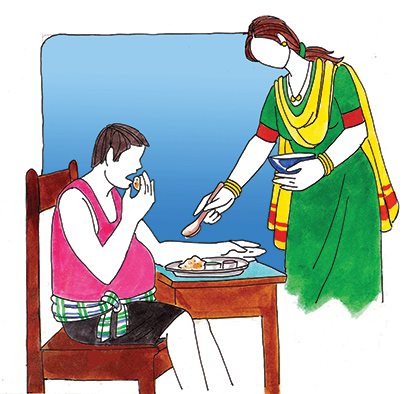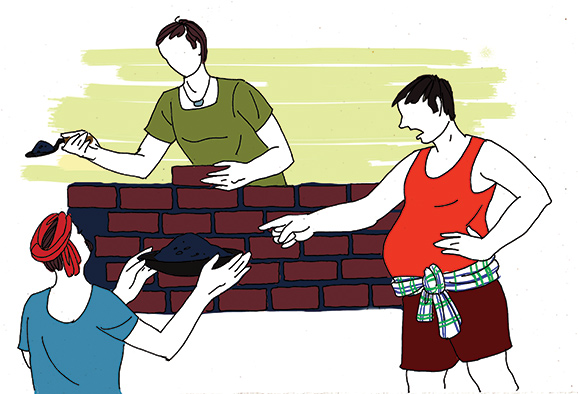Enough, Kanhu. Why are you shouting?’ The mistress of the house admonished the boy. Kanhu quietened down but did not stop cursing altogether; he came towards the house, still murmuring, a piece of broken brick in his hand. Venting his anger, he threw the brick towards the stack of sand.
He had found two bricks missing and that had fuelled his anger. The previous evening he had counted 84 bricks but this morning there were only 82. He did not know who had taken the two missing bricks. He stood on the road and abused all who went by, using filthy language.
His master’s house was under construction. The master and his family lived in their government-allotted quarters at the centre of the city. They usually came every morning and evening to supervise the progress of the construction, allotted work and paid wages to the labourers. Kanhu remained there throughout. He was the caretaker and manager rolled into one.
When someone called him junior manager, he felt proud and would get on with his job with even more enthusiasm. He used to say that if he had some educational qualification his master would have given him a good job. But he had studied only up to standard five.
He was a dark, short, portly boy of about sixteen. His belly protruded out like a pumpkin. His hair was straight like that of a hare. He wore a chain of tulsi beads (basil seeds) around his neck, which his mother had given him. He was wearing shorts and a red sleeveless vest with a hand-made towel wrapped around his waist.
A year ago, Kanhu came with Ramesh Tihadi from Nayagarh town to his present master’s house in the city. His father, a habitual drunkard, had left his mother and gone with another woman. Since then, his mother, who worked as a maid, had a tough time trying to make ends meet and feed the enormous appetite of her son. He was perpetually hungry, asking to be fed regularly. He used to poach the neighbours’ gardens and eat all fruits and vegetables available. There was constant trouble between the neighbours and his mother, who tried to shield her son. But Kanhu kept repeating his forays to quell his hunger. His mother would curse herself and cry; Kanhu, realising her problems, would promise not to repeat his follies. But his cursed hunger would once again force him to invade others’ gardens.
Tihadi requested the master of the house to feed the boy and give him a job, not bothering about wages.
Thousands of unfortunate, unemployed, hungry and destitute people from nearby rural areas thronged the city in search of jobs. Life was cruel to them and their future was uncertain. Still, they came in hordes hoping to achieve something in life.
Kanhu’s new master smiled. He himself had been shunting from town to town, as part of his job, and was yet to settle down. He wondered how he could do that for Kanhu. But, being intelligent, he said nothing. He knew one had to sell a dream in order to get a job done.
Man was not secure in his life whatever he did, he told his wife philosophically. The mistress looked at Kanhu and sized him up in a matter of minutes. She realised that he would be fit enough to supervise and guard the construction of their new house. Her husband agreed with her and gave three hundred rupees to Tihadi for Kanhu’s mother. Tihadi thanked them and left. Kanhu kept looking at the receding figure till he disappeared around the bend, sealing his break with his carefree life in the village like that of a drifting kite. The lady gauged Kanhu’s discomfiture and called him in. She gave him a bowl of flat rice and sugar to eat. Kanhu quietly sat on the verandah and had his food. For the first time, his hunger was satisfied as he dived into the bowl finishing the last morsel of food.
‘You must be tired after the bus journey. Take rest here. Spend your time in the garden. Tomorrow we shall go to the construction site of our house. You will stay there and look after the work. On completion of the house, we shall move there and you will stay with us,’ the lady of the house said.
Then she looked at Kanhu. His eyes were downcast and he was sobbing. He was probably thinking about his mother and his village. However, he continued to cry.
‘Are you missing your village?’ she asked.
‘Yes,’ he replied, still crying.
‘And your mother?’
‘Yes.’
She came near Kanhu and wiped the tears from the face of the lonely boy.
‘Okay. Once the house is completed, we will bring your mother; she will stay with us. Ramesh Tihadi comes here regularly. If you feel like it, you can go to meet your mother. Now you take rest. In a little while, my son Bubu will return from school and you can play with him. Now don’t cry,’ she consoled the boy.
Kanhu stopped sobbing and went to the back garden, which was marked with a variety of flowers and other plants, and mango trees. Kanhu tried to forget his loneliness and caressed the flowers. He had not seen such plants before. They were very different from the trees in his village. He could identify all the trees and plants in his village, starting with the tamarind, neem, mango, jackfruit, banana, papaya, etc. But in this garden the trees were smaller and of several different varieties. There were two mango trees. He looked up to see they were full of mangoes. He picked up a pebble and threw it. One mango fell from the tree. As he bent down to pick it up, he heard a voice and looked around.
He saw a boy younger than him, dressed smartly with a school bag on his back, holding a blue water bottle, wearing black shoes with white socks.
‘Who are you?’ he shouted.
Kanhu did not reply. The mistress of the house came out and introduced him.
‘This is Kanhu. He is from Nayagarh and this is my son Bubu.’
Bubu stared at Kanhu, who offered the mango to the boy.
Bubu appreciated the offer and told his mother, ‘Kanhu seems to be a nice boy. Look, how he aimed a target and got the mango with a single pebble. I am sure, he would be fit for the army.’
She ignored the praise and enquired whether their neighbour, Bana Mohanty, had removed the plants from their house plot. On being assured that it was done, she looked relieved. Or else, they would have had to wait a long while to construct the house.
They had purchased a plot of land on the outskirts of the city. They had entrusted the task of overseeing the land to Bana Mohanty, their neighbour. He was smart. He utilised the space to grow vegetables. So, they had to wait till his vegetables had been plucked and the ground cleared before they could start construction of the house. Now that this was done, they felt relieved.

The following morning they left for the site. There was a single room out–house by the side of the rear boundary. Cement was stored there. The mason also kept his implements there. There was an empty space in the corner, where Kanhu would live. They arranged for Kanhu’s food in a nearby shanty hotel. He would be provided with kitchen utensils and a heater, where he could cook his own meals. Kanhu was happy to be given the responsibility and the faith shown by his master.
About a year passed. A long time indeed! The boy from a remote village was now the manager of the construction work. He was much in demand. On every visit, his master and mistress took stock of the progress from him. Kanhu was smart. He took care to protect all the construction materials like sand, bricks, chips, etc. Even the mason and the labourers were scared of him as he supervised the work as if it was his own. He did not allow them to sit idle for a minute and admonished them, threatening to complain to his master in case of any failure.
The women labourers used to laugh at Kanhu’s demeanour. The mason would curse him. An upset Kanhu would shout back, ‘This is our house. Do you doubt me? If you don’t believe me, ask my master.’
The matter did not settle there as Kanhu would complain to the master and mistress whenever they came. He had a sharp memory and would recount the day’s events like the programme announced on a transistor radio, not forgetting the minutest of details.
The mistress would scold the mason for his misdemeanour, warning him not to repeat it. Kanhu would smile and make faces at him before walking away to take stock of the sand and bricks. Then the mason would curse him and his master.
Kanhu had settled into his routine with panache. He woke up early, before sunrise and finished his morning chores. Then he ran to the pump to lift water from the well. He took the plastic pipe and watered the half constructed walls for a couple of hours. Then he took stock of the materials; he would scoop up the scattered sand and chips, count the bricks. Only then would he go to his shack and have his usual breakfast of flat rice and sugar, just before the mason and labourers came to work. This morning he had not had his breakfast because of the two missing bricks, which had upset him.
‘Who are you shouting at?’ asked the mistress.
On hearing Kanhu’s explanation, she said, ‘Just for two bricks? If you shout like this, the neighbours would be upset.’
His master parked the car and came over. He told his wife, ‘Let him shout. It is all right, let the people know that he is guarding the house sincerely.’
Kanhu’s nature was of that type. He went hyper when happy or upset. Most of the time, he cursed his father. He said he was a drunkard. He would hit his mother daily. He would loiter around the house when she went to work. On her return, he would snatch the money she brought and go to the local country liquor shop. His mother would tolerate it, hug her son Kanhu and try to forget the humiliation. One day he fell for another woman and left them. Then Kanhu stopped ranting.
He consoled himself. Let the master’s house be completed; he would bring his mother from the village and they would stay in this house. She would not have to work in other houses, washing utensils.
Sometimes he went around inspecting the half-constructed house. He would identify the drawing room, bedrooms, toilets, kitchen, dining space, etc. Then he would stop at a small room that did not fit in. This, he assumed, in his naivety, would be his room.
The mistress noticed an empty pack of chewing tobacco near Kanhu’s room and asked him angrily if he took those. Before he could reply the master of the house took her aside and explained to her. It was good if he had a weakness. That way he would need money and ask her for it. That will ensure that he would remain here. Rather encourage him, so that his needs grow and, with it, his dependence.
She realised the philosophy behind those words.
They had been married for the past fourteen years and understood each other well. She smiled back at
her husband.
To be continued…
- Goura Hari Das (Translated from Odiya by Saroj Mishra)


